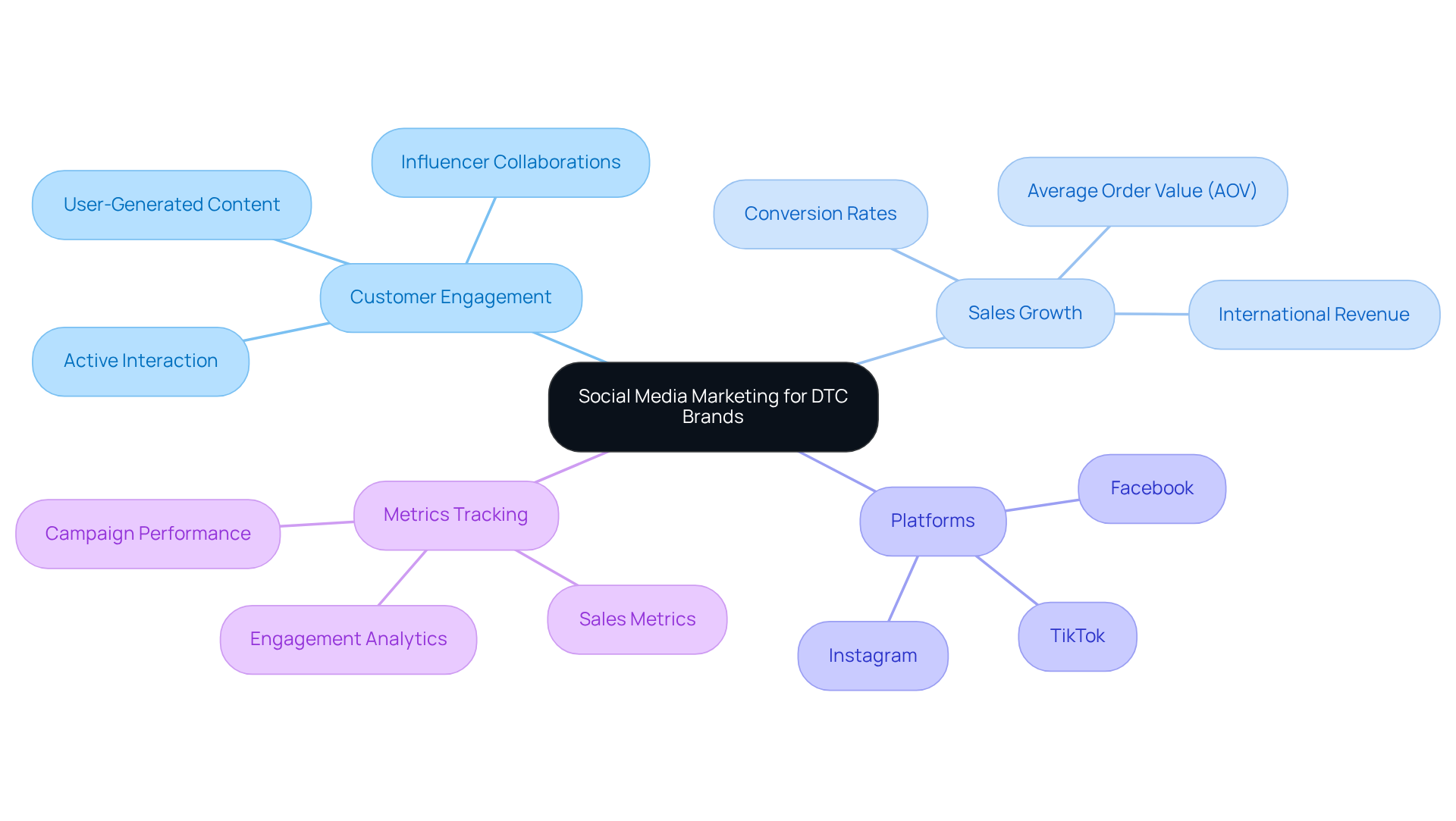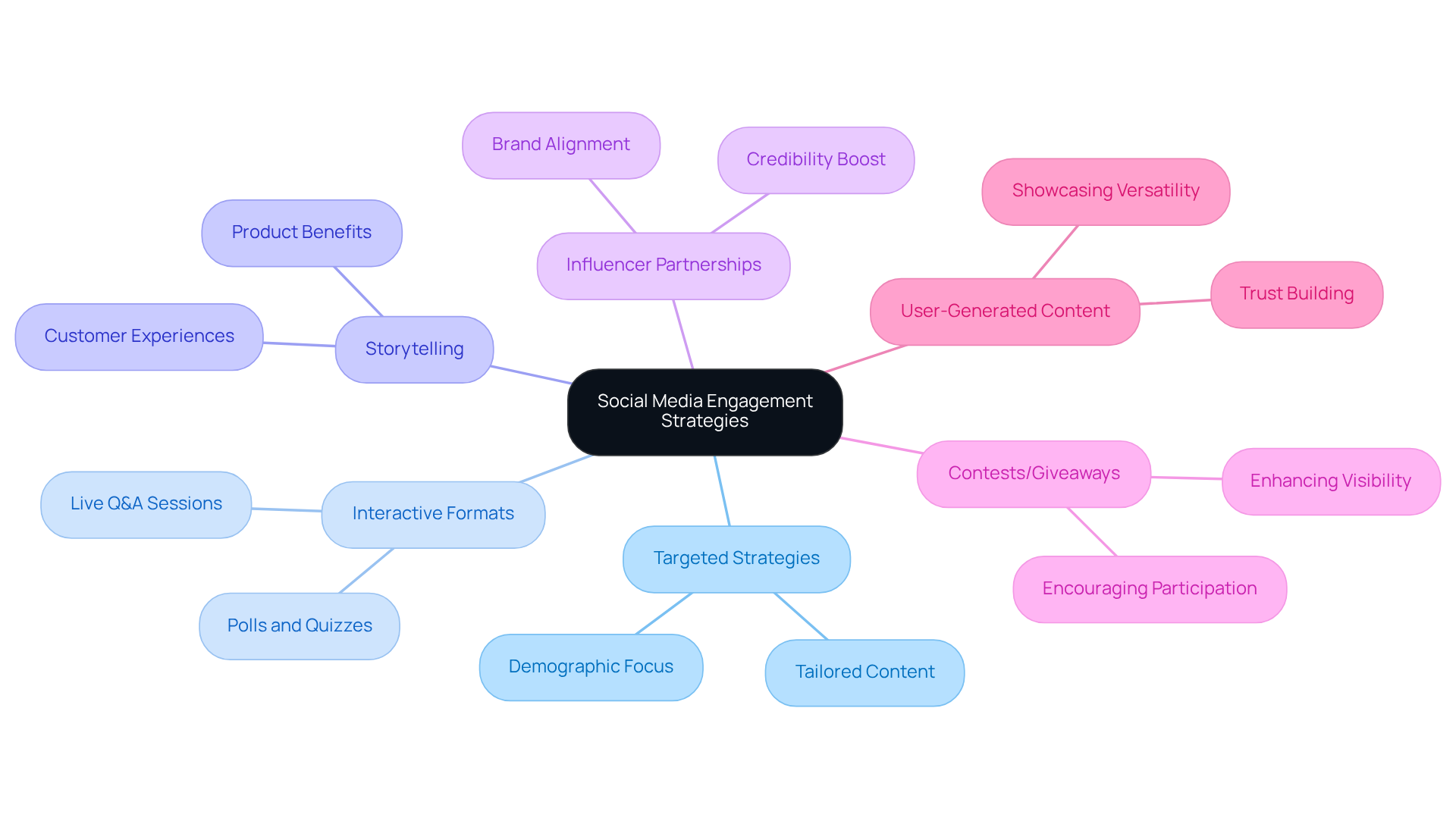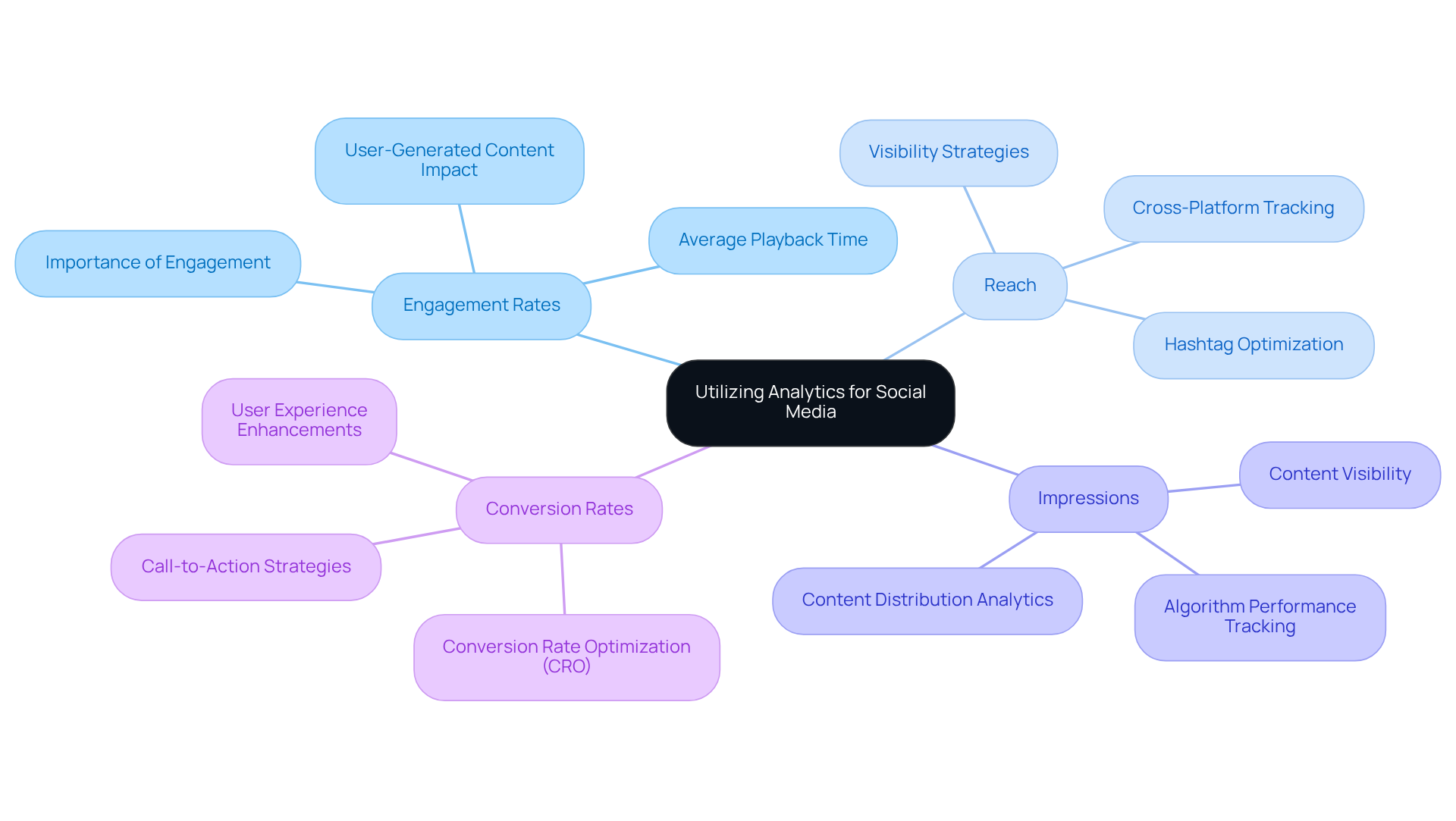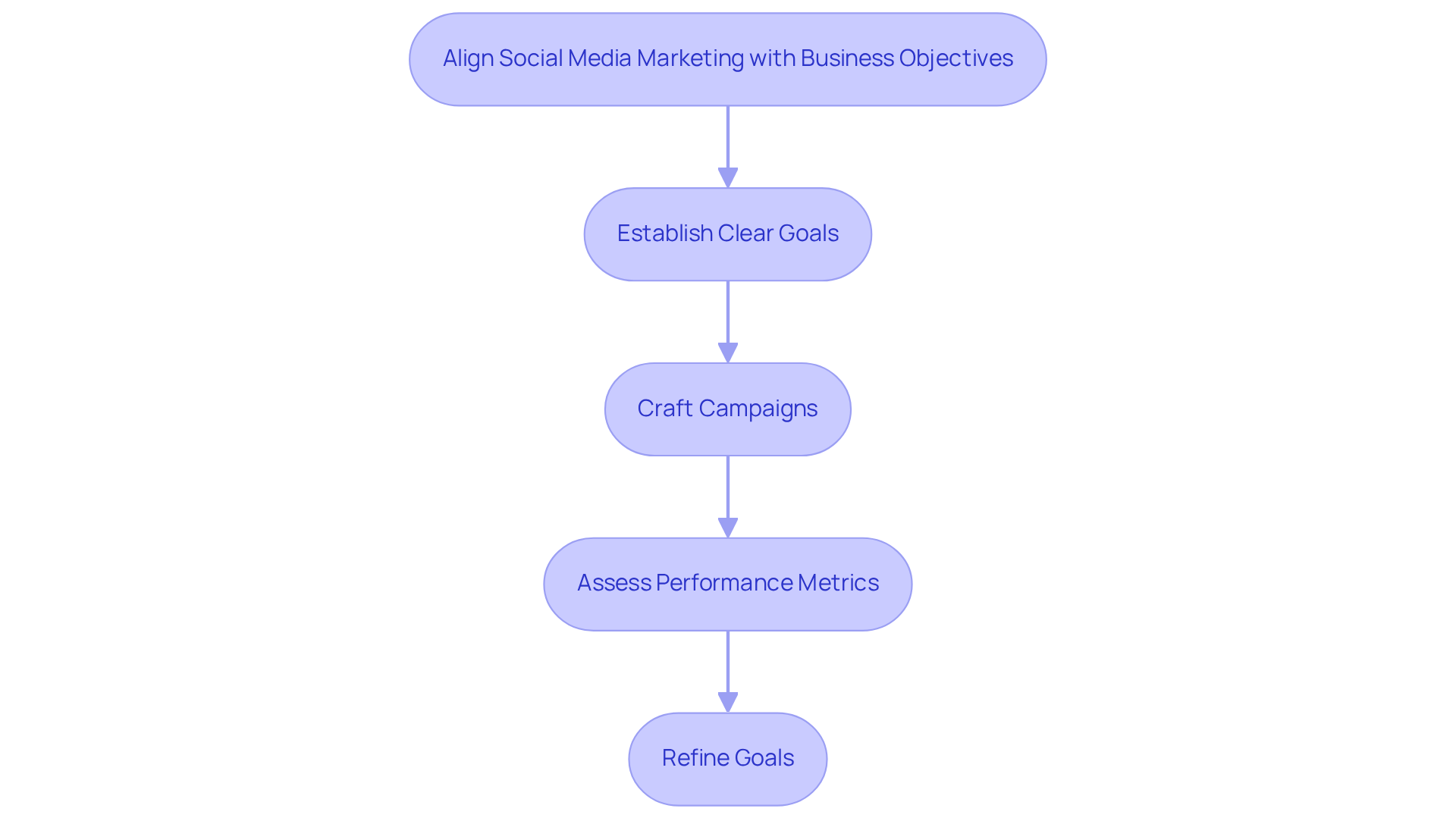
Overview
Achieving agency social media marketing success for DTC brands requires targeted strategies, effective engagement, and a steadfast alignment with business objectives. Analytics play a crucial role in tracking performance, providing the data necessary to refine approaches.
- Leveraging user-generated content enhances authenticity.
- Crafting tailored campaigns that resonate with specific audiences drives customer loyalty and propels sales growth.
This strategic focus not only fosters a deeper connection with consumers but also solidifies brand positioning in a competitive market.
Introduction
As the digital landscape evolves, direct-to-consumer (DTC) brands find themselves at a pivotal moment where social media marketing is not merely an option but a necessity. The potential for agencies to drive engagement, loyalty, and sales through targeted strategies on platforms like Instagram and TikTok is immense. However, with the rapid changes in consumer behavior and preferences, DTC brands must consider:
- How can they ensure their social media efforts are both effective and aligned with broader business goals?
This article delves into four essential strategies that empower DTC brands to navigate the complexities of social media marketing, optimize performance, and ultimately thrive in a competitive market.
Understand the Role of Social Media Marketing for DTC Brands
Agency social media marketing stands as a cornerstone for direct-to-consumer (DTC) labels, serving as a dynamic platform for customer engagement, loyalty, and sales growth. As we approach 2025, the online communication landscape is evolving rapidly, with platforms such as Instagram, TikTok, and Facebook emerging as vital channels for connecting with target audiences. DTC companies are positioned to leverage these online platforms for agency social media marketing to forge genuine relationships with customers, effectively showcase products, and narrate compelling company stories.
Harnessing user-generated content and influencer collaborations not only enhances credibility but also fosters community involvement—an essential component for driving conversions and elevating average order values (AOV). Notably, nearly 50% of companies derive 20% or more of their overall income from international markets, underscoring the critical role of online platforms in amplifying sales and engagement for DTC brands. With 44% of e-commerce leaders prioritizing , it is imperative for DTC companies to adapt their media strategies in response to shifting consumer behaviors and preferences. By focusing on high-quality, relatable content tailored for each platform, companies can significantly bolster customer engagement and loyalty.
Moreover, tracking metrics related to sales efforts is crucial for refining marketing strategies and enhancing brand recognition. Rieva Lesonsky emphasizes the importance of monitoring sales and analyzing metrics from commerce campaigns to optimize marketing efforts. As online platforms become increasingly integrated into the purchasing journey, DTC companies that prioritize interaction and utilize agency social media marketing to adjust their strategies accordingly will be better positioned to thrive in a competitive market.

Implement Targeted Strategies for Social Media Engagement
To effectively engage audiences on social media, DTC brands must adopt targeted strategies that utilize to resonate with specific demographics. Tailored content that addresses audience interests and needs is essential. Interactive formats—such as polls, quizzes, and live Q&A sessions—significantly improve participation rates. Studies indicate that interactive content can lead to higher user involvement and retention. In fact, companies earn an average of $5.20 for every $1 spent on influencer marketing, underscoring the financial advantages of effective interaction strategies.
Storytelling that emphasizes customer experiences and product benefits fosters a deeper connection with potential buyers. Partnering with influencers who align with company values not only expands reach but also boosts credibility, as followers are more inclined to trust suggestions from recognizable figures. Furthermore, frequently organizing contests or giveaways serves as a successful strategy to encourage participation and enhance visibility, fostering both interaction and loyalty among consumers. As Rachel Andrea observes, 'If you’re not interacting with your customers on online platforms, thousands of other companies are,' which underscores the competitive necessity for agency social media marketing among DTC companies.
Moreover, utilizing user-generated content (UGC) can improve trust in the company and highlight product versatility, transforming it into a powerful marketing tool.

Utilize Analytics to Measure and Optimize Social Media Performance
For DTC companies, leveraging analytics is essential for evaluating the effectiveness of social media marketing efforts. Key performance indicators (KPIs) such as:
- Engagement rates
- Reach
- Impressions
- Conversion rates
must be meticulously tracked. Tools like Google Analytics, Hootsuite, and Sprout Social offer invaluable insights into , enabling companies to pinpoint which content types resonate most effectively with their target audience. By systematically analyzing this data, companies can refine their strategies, ensuring that their online campaigns are not only impactful but also resource-efficient. Regular evaluations of analytics empower companies to optimize their online initiatives, aligning their resources with the most effective strategies to drive engagement and conversions.

Align Social Media Marketing with Business Objectives for Maximum Impact
For direct-to-consumer companies, aligning online marketing initiatives with business objectives is crucial for maximizing effectiveness. Research indicates that 93% of marketers currently leverage some form of online platform, underscoring its vital role in marketing strategies. Establishing clear and measurable goals—such as enhancing brand awareness, increasing website traffic, or driving sales—that reflect the overarching business strategy forms the bedrock of successful campaigns. Companies that articulate distinct digital marketing objectives experience a 60% increase in interaction rates, highlighting the necessity of this alignment.
Every online campaign must be crafted with these goals in mind, ensuring that content and engagement strategies are meticulously designed to achieve desired outcomes. For instance, brands like CeeCee’s Closet NYC have successfully harnessed platforms such as TikTok to significantly boost their follower count and sales, exemplifying the power of targeted online strategies.
Regularly reassessing and refining these goals based on performance metrics is essential for sustaining agility in a rapidly evolving market. This iterative methodology not only cultivates responsiveness but also propels ongoing growth and profitability. As Moh Arafat emphasizes, aligning agency social media marketing initiatives with business objectives is imperative for ensuring that every post and campaign contributes meaningfully to the broader goals of the organization. Thus, it is vital for DTC brands to with their agency social media marketing strategies.

Conclusion
Agency social media marketing is not merely an option but an essential component for the success of direct-to-consumer (DTC) brands. It provides a robust platform for meaningful customer engagement, brand loyalty, and increased sales. As the digital landscape evolves, DTC companies must harness the power of social media to build authentic connections with their audience, showcase their products, and effectively communicate their brand story. By adapting to changing consumer behaviors and preferences, these brands can create high-quality, relatable content that resonates across various platforms.
This article highlights several key strategies for achieving success in agency social media marketing:
- Implementing targeted engagement tactics
- Leveraging analytics to measure performance
- Aligning marketing efforts with overarching business objectives
Each element plays a crucial role in maximizing impact. The significance of user-generated content and influencer partnerships cannot be overstated; they enhance credibility and foster a sense of community, driving conversions and boosting average order values.
Ultimately, the effectiveness of social media marketing for DTC brands hinges on a strategic, data-driven approach. Companies are encouraged to continually assess and refine their marketing strategies based on performance metrics, ensuring alignment with business goals. As competition intensifies, embracing these best practices for agency social media marketing is not just beneficial—it is imperative for sustained growth and success in a rapidly changing marketplace. By prioritizing engagement, utilizing analytics, and maintaining a clear focus on business objectives, DTC brands can navigate the complexities of the digital landscape and emerge as leaders in their industry.
Frequently Asked Questions
What is the role of social media marketing for DTC brands?
Social media marketing serves as a crucial platform for customer engagement, loyalty, and sales growth for direct-to-consumer (DTC) brands, allowing them to connect with target audiences and showcase their products.
Which social media platforms are important for DTC companies?
Key platforms for DTC companies include Instagram, TikTok, and Facebook, which are vital for connecting with customers and promoting products.
How can DTC brands enhance credibility and community involvement?
DTC brands can enhance credibility and foster community involvement by harnessing user-generated content and collaborating with influencers.
What percentage of income do many companies derive from international markets?
Nearly 50% of companies derive 20% or more of their overall income from international markets, highlighting the importance of online platforms for DTC brands.
Why is flexibility important in global strategies for DTC companies?
Flexibility is important because 44% of e-commerce leaders prioritize it in their global strategies, necessitating DTC companies to adapt their media strategies to changing consumer behaviors and preferences.
What type of content should DTC companies focus on for social media?
DTC companies should focus on high-quality, relatable content tailored for each platform to enhance customer engagement and loyalty.
Why is tracking sales metrics important for DTC brands?
Tracking sales metrics is crucial for refining marketing strategies, enhancing brand recognition, and optimizing marketing efforts based on analyzed commerce campaign data.
How can DTC companies thrive in a competitive market?
DTC companies can thrive by prioritizing interaction on social media and utilizing agency social media marketing to adjust their strategies in response to consumer behaviors.
FAQs











